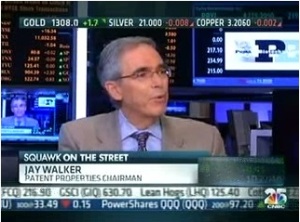Inventor and entrepreneur Jay Walker says new ideas are needed to make innovation less contentious.
He wants to make “no fault” patent licensing a reality.
Earlier this year Jay Walker merged remaining parts of Walker Digital, his invention company, into Patent Properties (OTC: PPRO). Patent Properties will continue to license his patents and soon introduce a potential game-changer, “a disruptive licensing solution for the mass market of patent owners and users.”
Walker sees huge untapped licensing potential in patents if the pricing is right. In the November IAM, out shortly, I look at Walker’s recent proposal to create a better environment for patent licensing in the U.S.  Interviews with him on CNBC, Bloomberg and the PPRO home page (linked), and the video on his firm’s website, provide revealing glimpses at what he hopes to achieve, and how he plans to achieve it.
Interviews with him on CNBC, Bloomberg and the PPRO home page (linked), and the video on his firm’s website, provide revealing glimpses at what he hopes to achieve, and how he plans to achieve it.
A Clearing House for Invention Rights
No doubt Patent Properties hopes to own a piece of each “no-fault” transaction, similar to how Priceline profits from travelers demand of available airline seats and hotel rooms. He sees the company as potential copyright clearing houses ASCAP or BMI, only in this case Patent Properties would be monitoring inventions, not songs.
“Of today’s 2.1 million active patents, 95 percent fail to be licensed or commercialized,” wrote Walker recently in a Forbes guest editorial. “These unlicensed patents include over 50,000 high-quality patented inventions developed by universities. More than $5 trillion has been spent in the U.S. alone on research and development over the past 20 years, much of which went to create the very patents that remain unlicensed.”
 While the much-licensed Walker Digital portfolio has generated since 2011 $65 million in revenues from licensing and litigating its patent portfolio as well as from patent sales, the immediate future for PPRO investors lies in the company’s 19 on-going litigation matters.
While the much-licensed Walker Digital portfolio has generated since 2011 $65 million in revenues from licensing and litigating its patent portfolio as well as from patent sales, the immediate future for PPRO investors lies in the company’s 19 on-going litigation matters.
Walker, who has never been accused of lacking vision or the energy and skills to convey a new idea, is a successful entrepreneur who founded Priceline.com (NASDAQ: PCLN), an early online auction business that was slow to start but now has a market value of $40 billion.
“We must develop an affordable and voluntary alternative that facilitates licensing for the vast majority of patents at fair, market-based prices, benefitting both sides of the patent equation,” says Walker. “And it is safe to say that Congress is not the right place to go for this solution.”
A more liquid market for patent licensing would help patents to lubricate the innovation machinery rather than throw a monkey wrench in it, as they have been known to. However, it will be difficult to achieve broad buy-in  from companies who see little upside in taking a license before they have to, and inventors who may see “no-fault” as little more than a compulsory license.
from companies who see little upside in taking a license before they have to, and inventors who may see “no-fault” as little more than a compulsory license.
Availability Pricing Model
You have to admire Walker for moving the ball forward with an innovative, market-based solution, presumably not unlike Priceline’s availability demand pricing mode that makes it easier for more holders to profit from inventions and avoid running afoul of them.
Walker may be on to something. At the right price it becomes difficult (nay, imprudent) for businesses not to take a license. Indeed, if anyone knows that establishing the right to practice a patent is not that different from bidding to buy an available airline seat, it is the Priceline founder.
Who knows? Market-based pricing — a reflection of how quickly and safely a business needs to get from here to there — may turn out to be among the more viable measures of what a business should pay and an inventor receive for the right to practice a patent.
Image sources: Bloomberg, CNBC, Patent Properties

